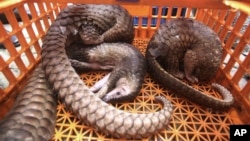In a major wildlife trafficking bust, Cameroon authorities have arrested six men for smuggling more than 700 kilograms of endangered pangolins and pangolin scales from the Central African Republic to Vietnam. Central Africa is a hotspot for illegally sourcing the scaly anteater for Asia, where its meat and scales fetch up to $1,000 per kilo.
Cameroon’s wildlife protection service said its officers and police caught six traffickers as they were attempting last week to smuggle pangolins and their scales through the Douala International Airport.
They arrested five people from Cameroon and one from the neighboring Central African Republic.
Wildlife Protection Service officer Suh Ngwa said the pangolins were brought into Douala from the capital of CAR, Bangui, by road. The traffickers were attempting to fly the endangered animals and parts through Nigeria to Asia.
"They [the suspects arrested] told us that approximately 230 big pangolins and 26 smaller ones were going to the Asian continent - precisely at Vietnam," said the officer.
Pangolin meat is considered a delicacy in Asia and parts of Africa, while its scales are highly sought after as traditional medicine.
The demand for pangolins has pushed the species to the edge of extinction and made it one of the most trafficked animals on the planet.
Central and eastern Africa are hotspots for sourcing and trafficking pangolins.
In June 2016, Hong Kong authorities seized four tons of pangolin scales smuggled from Cameroon. That same year, Cameroon authorities arrested two Chinese traffickers with five tons of scales that were about to be smuggled to China.
Ofir Drori is director of the Last Great Ape, a non-profit group that assists African states to protect endangered wildlife. He said central African states need tougher legislation to deter poachers.
"What you have seen here is just a snapshot of may be a weekly or may be [every] two week kind of trade of that specific group [pangolins]. As long as there are countries that could not be proud of a single wildlife prosecution we will still have these kind of problems," said Drori.
Cameroon’s wildlife law, he said, is among the region’s toughest. It deems anyone found in possession of parts of a protected animal presumed to have captured or killed that animal. The punishment could involve a fine of up to 20,000 dollars and a prison term of up to three years.
But the benefits too often outweigh the risk as pangolins are sold for hundreds of dollars per kilogram.
Drori said traffickers usually buy pangolin scales from smaller traffickers in Cameroon, CAR, and the Democratic Republic of Congo. The anteaters are then smuggled through Cameroon to Nigeria and on to Asia.
Pangolin traffickers are often linked to other endangered African animal smuggling – such as rhino horn and lion trophies.
Joseph Lekialem is Cameroon’s Director of Wildlife. He said officials are trying to stop poaching by providing alternative sources of income to communities where they are found.
He said they have initiated many revenue-generating activities like fish farming, bee farming for honey, and providing cocoa seedlings and drinkable water. Their goal, he said, is to make the local populations comfortable so they will stop selling protected wildlife to poachers and be true friends of nature. But the problem, noted Lekialem, is that many people still harvest huge quantities of wildlife for commercial purposes, which is prohibited by the law.
Wildlife protection advocates say large-scale trafficking is only possible through a network of corruption.
Cracking down on corrupt officials and police who facilitate the illegal pangolin trade is key to stopping it, said Drori.
"The most important thing is fighting corruption. This kind of wildlife trade is connected to organized crime. And the only way to tackle organized crime is to fight corruption and complicity that is enabling it," he said.
The international trade in pangolins was totally banned in 2016 under the Convention on the International Trade in Endangered Species (CITES). But, high consumer demand in Asian countries, and parts of Africa, is fueling the illegal market.
Cameroon last year burned more than three tons of pangolin skins and scales seized from smugglers and destined for Asia.
Authorities said it was sending a strong signal that Cameroon would no longer be a country where poaching and smuggling ran rampant.
